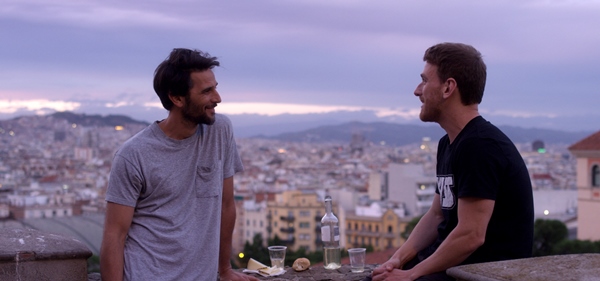![]() This deceptively straightforward drama opens with Ocho (Juan Barberini), newly arriving in scenic Barcelona where an Airbnb rental awaits him. Through long, dialogue-frees takes featuring minimal camera movement, the film accompanies Ocho, a poet in his late 30s, over the course of a day as he alternates between lounging and sightseeing and cruising. An air of disaffectedness surrounds him as he either watches people from his balcony or scrolls through Grinder absentmindedly. Ocho catches the eye of a man, about a decade younger with ginger hair, at the beach, and after this near-encounter, Ocho sees him again and invites him upstairs.
This deceptively straightforward drama opens with Ocho (Juan Barberini), newly arriving in scenic Barcelona where an Airbnb rental awaits him. Through long, dialogue-frees takes featuring minimal camera movement, the film accompanies Ocho, a poet in his late 30s, over the course of a day as he alternates between lounging and sightseeing and cruising. An air of disaffectedness surrounds him as he either watches people from his balcony or scrolls through Grinder absentmindedly. Ocho catches the eye of a man, about a decade younger with ginger hair, at the beach, and after this near-encounter, Ocho sees him again and invites him upstairs.
But what happens on either side of their congress also serves to awaken Ocho and the film from its sleepwalking state: the two men get to know each other through conversation, and their chemistry. There is a sense that their sexually-charged encounter might actually lead to something more. The younger man, Javi (Ramon Pujol), invites Ocho to hang out with him. Splitting a bottle of wine between themselves on a rooftop, they talk about relationships, past and present, and family. Javi, who lives in Berlin, is married to another man with whom he is raising a young child, while the New York–based Ocho is newly single after ending a long-term partnership.
For the first half of his feature debut, writer-director Lucio Castro focuses on drawing sharp distinctions between his two main protagonists and highlights the differences between them. Although Ocho talks a good game about enjoying his newfound freedom from committed relationships, once Javi appears open to his advances, Ocho is especially quick to build intimacy with him. By contrast, Javi seems most honest about who he is and what he wants in life. He also has a warmth and playful side. During the initial moments of their tryst, he sends Ocho out to buy some condoms. When the latter returns, Javi claims not to like the brand he picked up, leading to a beat in which Ocho appears genuinely crestfallen, at which point Javi admits he was only joking.
But just as we are falling into a comfortable rhythm with these men—as they are with each other—Castro turns everything we know about them onto its head. Javi assures Ocho that they have, in fact, met before, prompting the narrative to travel back to 1999. Without giving away too much, let us just say the second act fills in some blanks. But more importantly, we see the extent to which these two men have changed over time and how their first encounter affected those changes.
Barberini and Pujol do fine work, as does Mia Maestro as Sonia, an opera singer who doubles as an unexpected link between the two men. On more than one occasion, she shows off her soprano voice, which is fitting as Sonia emerges as a nearly tragic figure—or at least, in Ocho’s unconscious. However, the real star of the film is Castro, who captures the deliberate rhythms of a life lived in the moment. The spell breaks during one brief scene in which Ocho and Javi find themselves dancing to A Flock of Seagulls’ “Space Age Love Song” following a night of revelry. The shaky, jittery camerawork is a sharp contrast to the more restrained approach capturing what is, for Ocho, a rare moment of absolute, unbridled joy.
End of the Century is a thoughtful meditation on how definitive moments happen when we least expect them, as well as about the magic of a romantic connection. It also features postcard-worthy images of the streets, public squares, parks, and beaches of Barcelona, which are indeed inviting. The surrounding film will make you not want to visit them alone.







Leave A Comment